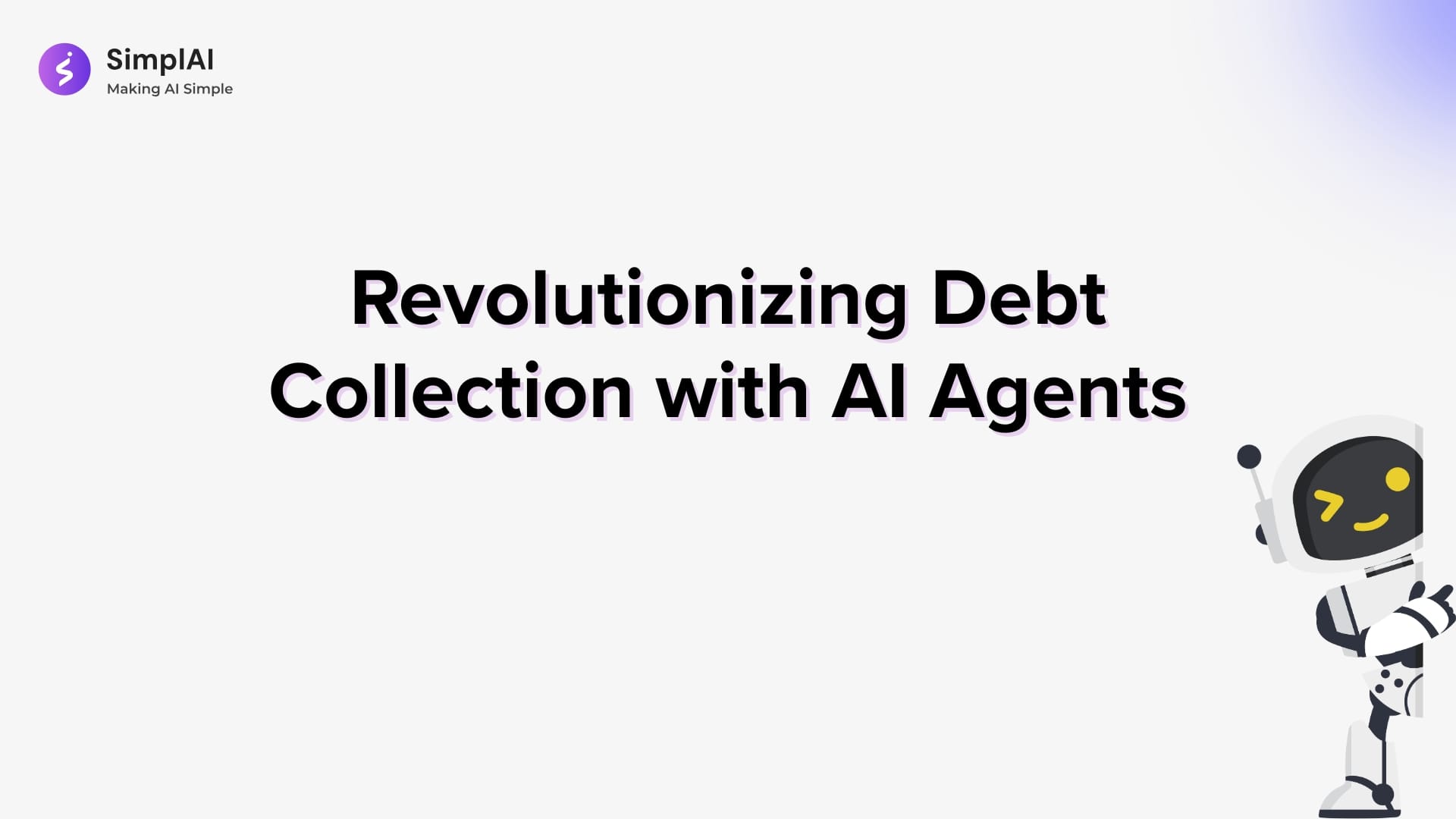Revolutionizing Debt Collection with AI Agents: SimplAI’s Role in Transforming the Industry

Introduction to Debt Collection AI Agents
Debt collection has long been a challenging industry, marked by repetitive tasks, regulatory complexities, and often strained customer interactions. Enter Debt Collection AI Agents—innovative software solutions that leverage artificial intelligence to automate and optimize the debt recovery process. These agents handle tasks such as identifying overdue accounts, sending reminders, tracking repayments, and communicating with debtors across multiple channels like email, SMS, and voice calls. By automating routine processes, AI agents enable human collectors to focus on high-value, complex cases, improving both efficiency and customer satisfaction.
The rise of AI in debt collection is transforming an industry traditionally reliant on manual processes. Companies like SimplAI are leading the charge with solutions that streamline operations and enhance debtor experiences. This blog explores how Debt Collection AI Agents work, their benefits, real-world applications, challenges, and the future of this technology, with a special focus on SimplAI’s contributions.
How Debt Collection AI Agents Work
Debt Collection AI Agents rely on a combination of advanced technologies to perform their functions effectively. These include:
- Machine Learning (ML): ML algorithms analyze historical debtor data to predict repayment likelihood, enabling collectors to prioritize accounts with higher recovery potential. For instance, predictive analytics can identify patterns in debtor behavior, such as payment histories or financial trends, to tailor collection strategies.
- Natural Language Processing (NLP): NLP powers chatbots and virtual assistants to handle debtor inquiries. These tools understand and respond to questions in real-time, whether through text or voice, providing instant support and reducing the need for human intervention.
- Automation Tools: AI agents automate repetitive tasks like sending payment reminders, scheduling follow-ups, and updating account statuses. They can communicate via multiple channels—email, SMS, WhatsApp, or phone—ensuring consistent and timely outreach.
For example, an AI agent might identify an overdue account, send a personalized SMS reminder, and update the system when a payment is received, all without human involvement. These technologies work together to create a seamless, scalable debt collection process that minimizes manual effort while maximizing results.
Benefits of Using AI in Debt Collection
The adoption of AI in debt collection offers numerous advantages for businesses, collectors, and debtors alike. Here are the key benefits, supported by industry insights:
Cost Savings
AI agents significantly reduce operational costs by automating routine tasks. According to industry reports, businesses can save up to 50% on agent-related expenses by using AI to handle repetitive processes like sending reminders or processing inquiries. This allows companies to allocate resources more effectively, focusing human agents on complex cases that require empathy and negotiation skills.
Improved Efficiency
AI agents can manage a high volume of accounts simultaneously, processing tasks faster than human collectors. They categorize accounts based on priority, track repayment progress, and automate follow-ups, leading to quicker debt recovery. For instance, tools like SimplAI’s Debt Collection Solution can handle 100% of written inquiries, as demonstrated in their partnership with Fair Collection, a Norwegian debt collection agency.
Enhanced Customer Experience
Traditional debt collection methods can feel intrusive or stressful for debtors. AI agents improve this by offering personalized, empathetic communication tailored to individual circumstances. NLP enables AI to craft messages that resonate with debtors, increasing the likelihood of repayment while maintaining positive relationships. For example, SimplAI’s solution analyzes debtor queries and responds with customized solutions, fostering trust and satisfaction.
Regulatory Compliance
Compliance with regulations like GDPR or the Fair Debt Collection Practices Act (FDCPA) is critical in debt collection. AI agents can be programmed to adhere to legal guidelines, such as timing restrictions for communications or data protection protocols, reducing the risk of human error. Real-time monitoring and prompts further ensure that every interaction stays within regulatory boundaries.
Scalability and Real-Time Analytics
AI solutions are highly scalable, allowing businesses to handle growing portfolios without proportional increases in staff. Real-time predictive analytics provide insights into debtor behavior, enabling data-driven strategies that optimize recovery rates. These capabilities make AI an invaluable tool for modern debt collection agencies.
| Benefit | Description | Example Impact |
|---|---|---|
| Cost Savings | Reduces need for human agents by automating tasks | Up to 50% reduction in agent costs |
| Improved Efficiency | Handles high volumes, prioritizes accounts, automates follow-ups | Faster debt recovery |
| Enhanced Customer Experience | Personalized, empathetic communication | Higher repayment rates, better trust |
| Regulatory Compliance | Adheres to legal guidelines, reduces errors | Minimized legal risks |
| Scalability & Analytics | Manages large portfolios, provides real-time insights | Data-driven strategies, higher returns |
Case Studies: SimplAI and Beyond
SimplAI’s Debt Collection Solution
SimplAI offers a Debt Collection Solution that transforms how agencies manage debt recovery. This tool leverages AI to automate administrative tasks, analyze debtor queries, validate documents, and inform stakeholders. By identifying financial patterns in debtor behavior, it makes informed decisions, such as prioritizing accounts or suggesting repayment plans.
A notable example is SimplAI’s partnership with Fair Collection, a Norwegian debt collection agency founded in 2018. Fair Collection aimed to innovate an industry stagnant for decades by adopting SimplAI’s AI-powered Digital Employee. This solution automated 100% of written inquiries—whether received via web forms, portals, or emails—by reading, interpreting, and responding to them. It also verified information, updated back-end systems, and escalated sensitive cases to human handlers. The result was a smoother customer experience, faster partner settlements, and reduced operational costs, showcasing the power of AI in real-world debt collection.
Other Industry Examples
Beyond SimplAI, other companies are making strides in AI-driven debt collection:
- Kolleno: Kolleno’s AI Agent acts as a collections team assistant, automating routine tasks and providing real-time answers to team queries. It enhances efficiency by streamlining workflows and prioritizing high-value accounts.
- Floatbot: Floatbot’s GenAI-powered voicebots and chatbots, like their LEXI agent, handle low-balance and out-of-statute debts with empathy and compliance, reducing costs and improving recovery rates.
These examples highlight the versatility of AI agents across different debt collection scenarios, from small-scale recoveries to enterprise-level operations.
Challenges and Considerations
While AI offers transformative potential, its adoption in debt collection comes with challenges that businesses must address:
Potential for Bias
AI algorithms rely on historical data, which may contain biases that could lead to unfair treatment of certain debtor groups. For instance, if past data reflects discriminatory practices, the AI might perpetuate these biases in its decision-making. Companies must actively monitor and adjust their models to ensure fairness and compliance with anti-discrimination laws.
Data Privacy
Debt collection involves sensitive personal and financial information, making data security paramount. AI systems must incorporate robust encryption and comply with regulations like GDPR or CCPA to protect debtor data. A breach could undermine trust and lead to legal consequences.
Integration Challenges
Integrating AI solutions with existing systems can be complex, requiring updates to IT infrastructure and staff training. Businesses must plan carefully to ensure a smooth transition, as poorly managed implementations can disrupt operations.
Addressing these challenges requires a commitment to ethical AI practices, including regular audits, transparent data handling, and comprehensive change management strategies.
The Future of AI in Debt Collection
The future of AI in debt collection is poised for significant advancements. Generative AI could enhance real-time support for human agents, suggesting tailored language and tone during live interactions to improve outcomes. For example, AI could analyze a debtor’s emotional state via sentiment analysis and adjust communication accordingly, fostering more empathetic exchanges.
Integration with emerging technologies, such as blockchain for secure payment tracking or IoT for asset monitoring, could further streamline debt recovery processes. Enhanced compliance tools, powered by AI, will continue to reduce regulatory risks by automating adherence to complex legal frameworks. Companies like SimplAI are likely to lead these innovations, offering scalable platforms that integrate seamlessly with enterprise systems.
As AI technology evolves, we can expect debt collection to become more efficient, transparent, and customer-centric, potentially reshaping the industry’s reputation for the better.
Conclusion
Debt Collection AI Agents are revolutionizing an industry long plagued by inefficiencies and negative perceptions. By automating repetitive tasks, enhancing customer experiences, and ensuring compliance, these tools offer a smarter, fairer approach to debt recovery. SimplAI’s Debt Collection Solution exemplifies this transformation, as seen in their successful partnership with Fair Collection, which automated 100% of written inquiries and improved operational efficiency.
Businesses looking to modernize their debt collection processes should explore AI solutions like SimplAI’s, which offer scalability, cost savings, and enhanced customer trust. While challenges like bias and data privacy require careful attention, the potential benefits make AI a game-changer for the industry. Visit SimplAI’s website to learn more about their innovative solutions and how they can transform your debt collection strategy.
Citations:

